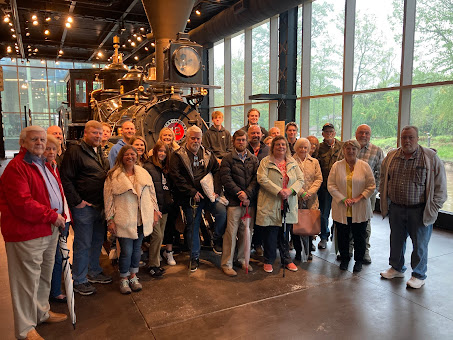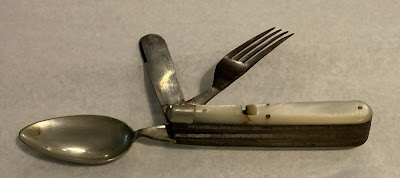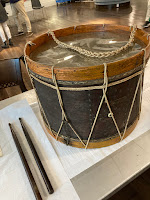 |
| Gordon Jones with drum, a revolver and James L. Lemon's prize watch (Picket photos) |
There were
personal items, a captured drum, revolver, letters, canteen, photographs and
much more. Many artifacts were labeled with handwritten notes by Capt. James Lile Lemon of Company A, 18th Georgia Infantry, who fought in the
Virginia theater and survived a year and a half in Union prison camps.
“I am speechless at this entire collection, to see it all together, said Heather Spann, of Kennesaw, Ga., a third great-granddaughter of Lemon (left).
“It is amazing how meticulous he was in
keeping records,” said Fred Aiken, a member of the Atlanta Civil War Round Table.
Aiken, along
with about 20 members of the Lemon family, most living in northern Georgia,
were invited to the AHC to see the impressive collection
the institution purchased from the widow of a Macon, Ga., collector in 2020.
The set includes three wartime diaries.
“He literally
saved everything,” said host Gordon Jones, senior military historian and curator
at the AHC. Lemon was “an individual who was thinking ahead about his own
legacy.”
Jones told
the Lemon family that their ancestor is a quintessential example of the human
experience in the Civil War. “This is storytelling stuff. People love it.” It
is the history center’s fortune to have such a complete collection, he added.
 |
| Lemon descendants and others before seeing collection (Picket photo) |
While
“Turning Point” still attracts visitors, the AHC believes it is a dinosaur, and
it is raising money for a new exhibit that will offer newer, fresher and more
inclusive perspectives of the conflict. The Lemon collection, Jones said, will
be shown to the public as part of that effort.
When the war
broke out, Lemon was living in Acworth, about 30 miles northwest of Atlanta. His
family had seven enslaved persons, and Lemon wrote in his memoirs that he freed them.
There is some dispute over the claim, according to the AHC.
 |
| Descendant Mark Lemon lives in the Acworth home |
The regiment
fought in numerous Eastern battles – including Antietam,
Fredericksburg, Second Manassas and Chancellorsville. The farmer and merchant
had a close call at Gettysburg, when a Yankee bullet struck his canteen, causing it to strike his head.
His combat
days came to a close in November 1863, when Lemon was severely wounded by a
Minie ball in the pharynx and taken prison after an assault on Fort Sanders in
Knoxville, Tenn.
 |
| Mark Lemon (left) brought sword given by Union NCO to J.L. Lemon (Picket photo) |
The captain’s
brief time at Pulaski is part of the story of the "Immortal 600", a
fascinating footnote to the conflict. The story is involved, but here’s a
summary:
In summer
1864, Confederate Maj. Gen. Samuel Jones essentially used 600 captured Union
officers as human shields, in a section of Charleston, S.C., in the line of
fire. The North retaliated by transporting 600 POWs from Fort Delaware to
Morris Island, S.C., in direct line of Rebel guns.
“For nearly three months, the stalemate continued. It wasn’t until yellow fever broke out in the city of Charleston that the Confederacy removed the Union prisoners to newly erected prison camps further inland,” the National Park Service says. “With the Union prisoners removed from Charleston and no longer under fire from Union artillery, there was no need to keep the Confederate prisoners on Morris Island. With this realization, the next phase of their journey began and the Immortal 600 began the journey south, to Cockspur Island and Fort Pulaski.”
While held at Fort Pulaski, Lemon etched his name into a wall. (At right, blanket near top of photo was given to Lemon while he was held there. Click to enlarge)
Lemon and
other prisoners were returned to Fort Delaware toward the war’s end.
He earned the
respect of one of the prison staff, who also had the name Lemon. Sgt. Lemon
Kline of the 215th Pennsylvania Infantry gifted him an NCO sword when the Confederate was paroled.
Lemon, who somehow managed to get the weapon back to Georgia, wrote a notation
about it, as was his practice.
Mark Lemon,
great-great grandson of Lemon and author of “Feed Them the Steel!”, a history
of Lemon and his regiment, brought the sword to the AHC, eliciting much
excitement from Jones. The book, written as a narrative, includes many battle
and POW accounts written by James Lile Lemon.
Lemon lives in the home built by his ancestor in 1856.
At war’s end, James Lile Lemon refused to take
an oath of allegiance to the United States, citing his treatment, but he
eventually did take it in June 1865. Family today considers him a “diehard”
Confederate.
In his journal, Lemon wrote: “I have done the
unspeakable but I am now paroled & to day set out for home. My duty to my
country is done, mine to my family remains.”
The officer returned to Acworth and had 11
children with his wife Eliza. He was a retail merchant and then a bank
executive, serving as president of the bank when he died on June 12, 1907, at age 72. Lemon had published a compelling memoir in 1886, the same year the
Cyclorama was painted.
For Jones, Lemon’s meticulous record-keeping has
paid off. “The story was
there. It was just matching it to the artifacts.”
Here are some highlights from the AHC’s Lemon
collection that were shown to the family:-
 |
| (Picket photo of sketch) |
-- An Adams
revolver with “JL” and “18th GEO” carved into the grips (see photo at top of this post). Jones
believes the officer gave the gun to his brother Smith, who used it while
serving in the Georgia State Line. It saw action at the Battle of Atlanta in
July 1864. (Lemon’s gun that he lost at Knoxville is today in a private
collection in Milwaukee.)
-- Lemon’s
engraved gold watch, made in Liverpool, presented by his brother Smith Lemon on
October 27, 1861. Lemon lost the watch when he was wounded at Knoxville, but
later spotted it on a Union soldier and managed to retrieve it, according to
his memoir. (See photo at top of this article)
 |
| (Picket photo) |
-- Union
canteen (below) Lemon picked up in the Wheatfield at Gettysburg after his own canteen
had been ruined by a bullet (a Yankee bullet hit the canteen, and it struck the
head of Lemon, who thought he had been shot). The strap bears Lemon's initials,
date and initials of the dead 4th Michigan soldier from whom he got it.
 |
| (Picket photo) |
 |
| Lemon wrote Pvt. Boring's name into drumhead (Picket photo) |
“On the evening of the 16th our briggade was ordered to form line of battle & we advanced into a cornfield & into a piece of timber where we met almost by accident a force of the enemy. We drove them with style back through the woods, capturing some Yanks from the 1st & 3rd Penn'a Reserves. Among this bunch were a couple of drummer-boys, about 12 or 13 years old who were trying hard to "put on a brave face," but who were clearly terrified.
"Col. Ruff ordered their drums confiscated & then released as we were not equipped or inclined to care for children. Our drum had been damaged & thrown away at Groveton, so we took theirs as "spoils of war." Private Boring captured the boys. As he was driving them to the rear at point of bayonet they heaped so much abuse upon him -- out of their fear or nervousness -- that he had to be restrained from striking them with the clubbed musket.
"Of course,
instantly the target of many wags among our company who joked with him about
"scaring little boys" & etc. He replied that he would be d---d if
he'd take such abuse from "d---d Yankee whelps." The boys were
release(d) & "beat a hasty retreat" back to their lines, with
Boring giving them a rite hard look as they went.”
 |
| One of James Lile Lemon's journals (Picket photo) |




No comments:
Post a Comment